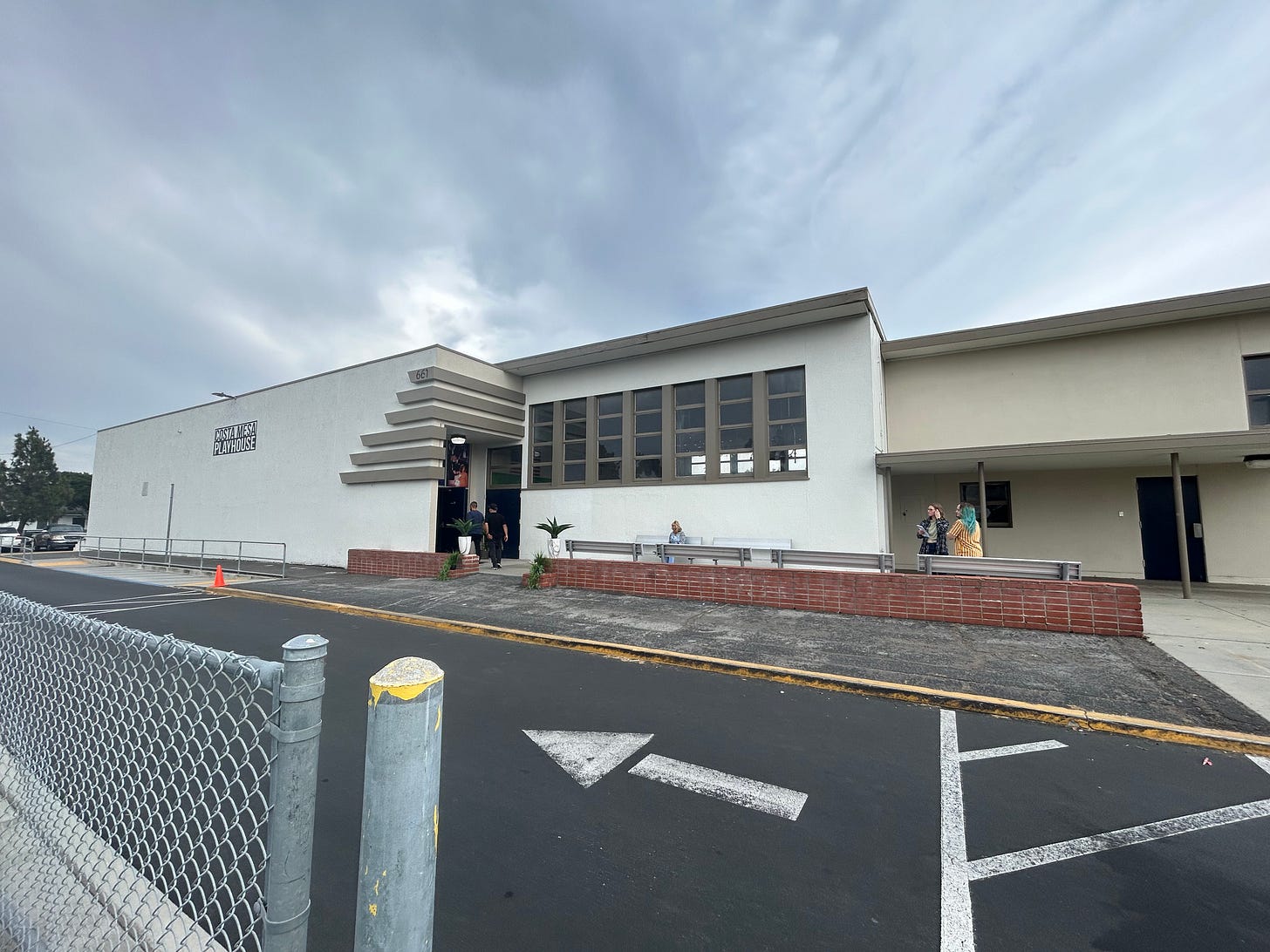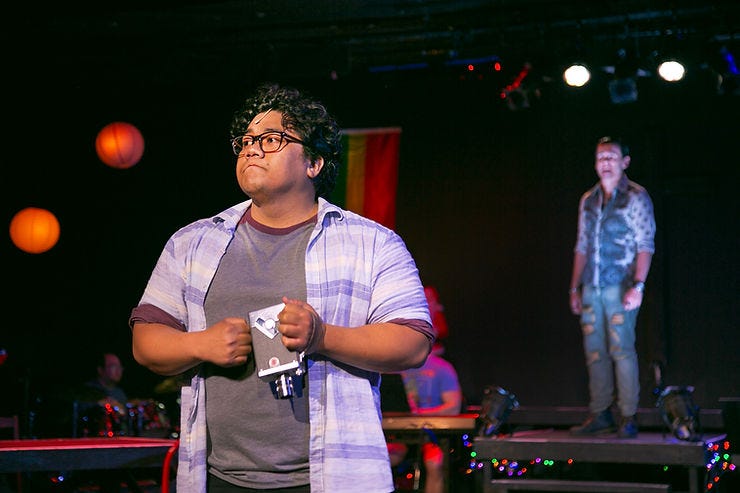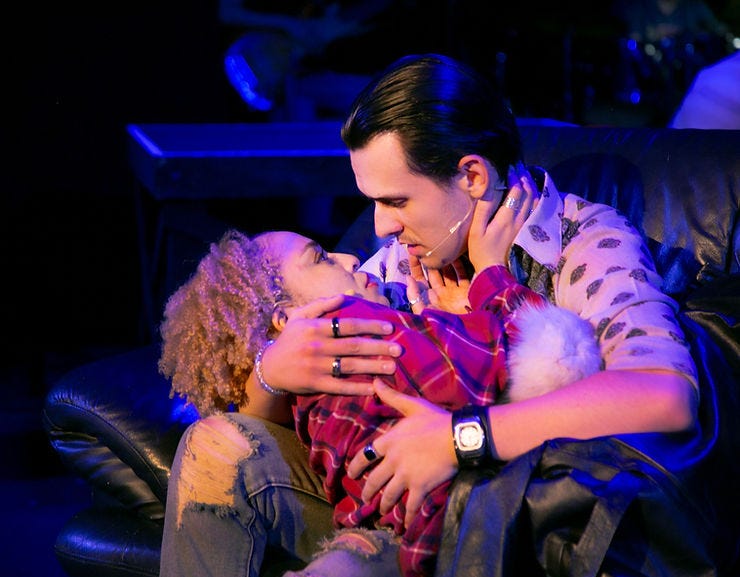There’s a pivotal scene in Judy Blume’s, “Are You There God? It’s Me, Margaret” where the titular character first realizes her peers are sexually advancing beyond her years. Periods, bras, make-out sessions with boys? It was all too much.
I experienced this same terror at a slumber party in 7th grade when everyone seemed to have swapped their Spice Girls tapes for Rent’s original Broadway score on a double-disc CD. Heroin, AIDS, self-indulgent films shot on a bulky Super 8— why couldn’t we all just stay so innocent and young?
Every theater generation has its own “horny show”: the kind you either sexually awake to or unleash all that’s been packed ever-so-tightly behind heavy heaps of stage make-up: in the ‘60s, it was Hair; ‘70s, Chicago; ‘80s, Cats— but then the ‘90s came along and the air was far too thick for the daffy eroticism of a spandexed human-feline giving you a literal lap dance next to an 80-year old stranger at a Sunday matinee. People were dying, the economy was tanking, and somewhere Jonathan Larsen was ringing in his tenth year waitering at the Moondance Diner, struggling to write one musical, unaware he was actually writing another1. For him, the horny legacy of Rent was never a goal, but that’s the natural alchemy of young people scream-singing about injustice.
Which is why it’s so odd witnessing this show in a theater attached to an elementary school in the middle of Costa Mesa.
It’s a 2pm in late July and I’m at the first of two stops to a fictional Hell’s Kitchen, where a 73-seater will soon be filled with friends and family hooting their respects in its final bow. The parking lot is fortunately free after my 1.5 hour bumper-to-bumper butt-number from the depths of Valley Glen (née Van Nuys) and the last thing I wanna do is hear Sublime’s “Santeria”, but it’s all that greets me in the lobby because it’s the year 1996 in the year 2023 and No Doubt will shortly follow.
I’ll admit, Bradley Nowell aside, the music is a great choice. It sets the tone, like your friend buying a decorative Christmas tree for their holiday party, knowing full well it’s going to be puked on twig-to-trunk way before Santa gets here. The Costa Mesa Playhouse is full of these tiny touches, because it’s all they have room for: the lobby’s the size of a small apartment, the concessions an obvious IKEA assemble, the box office more a storage for flyers and hand sanitizers. They would like to make clear they “are not connected nor receive any monetary support from Rea Elementary School,” for which they share a campus. I nod, but immediately estimate how many times a whole class of 3rd graders accidentally glimpsed a pack of roving Fosses.
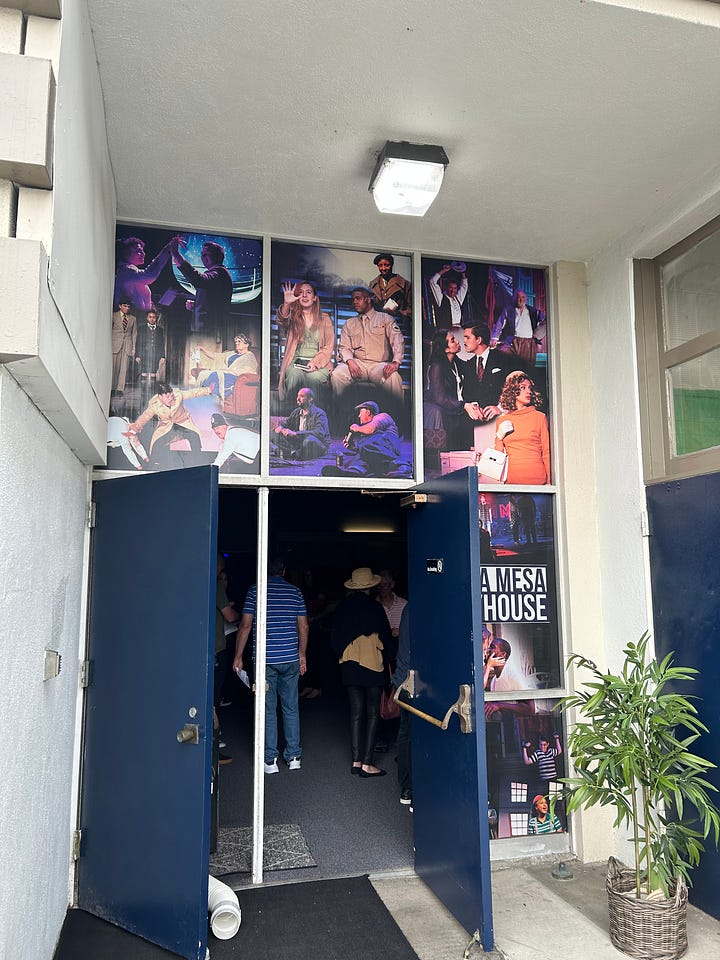
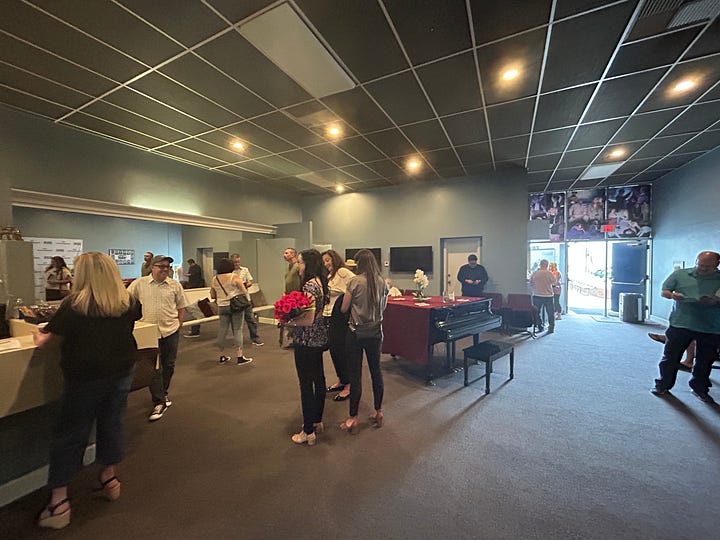
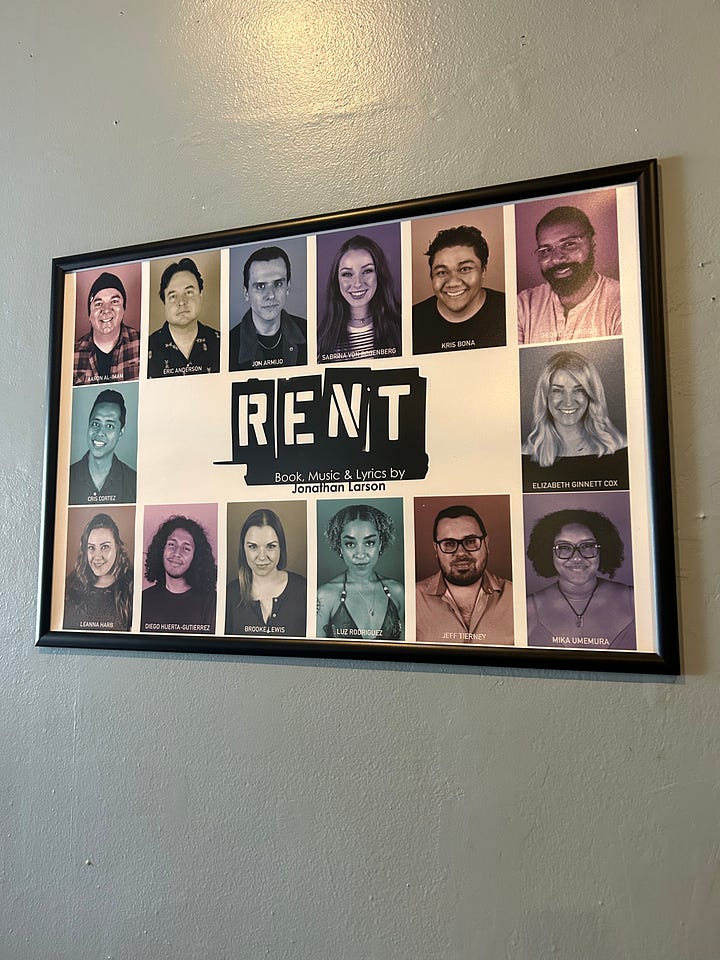
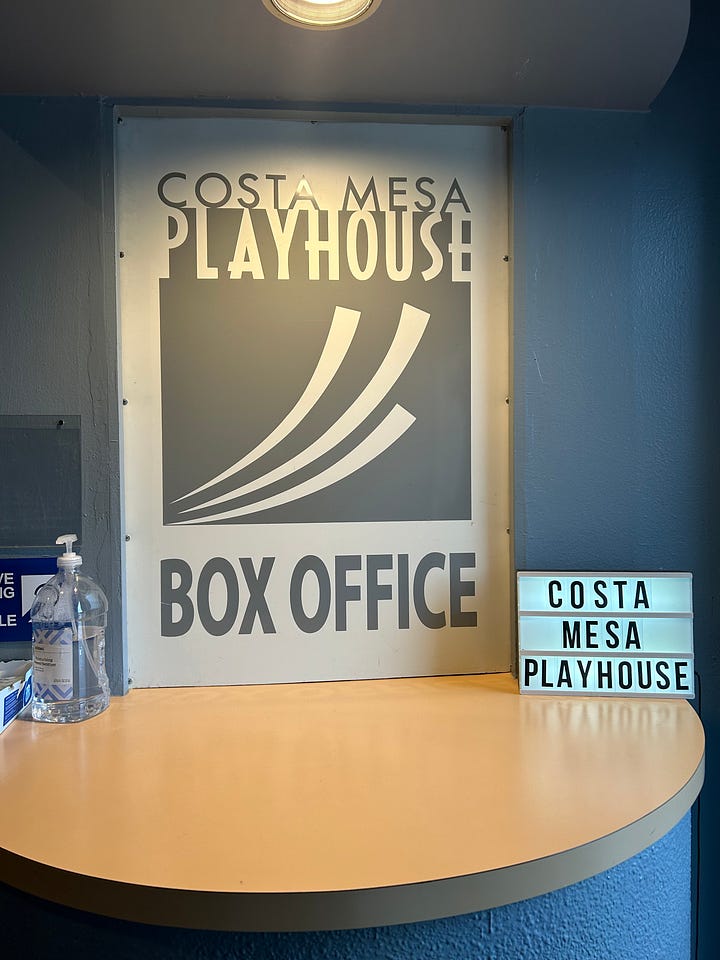
For director Michael Serna, he’s okay with his cast not clicking with the playlist. When Rent first took the Nederlander Theatre, he was one of the lucky few who camped out and coughed up $20 to sit close enough to watch Taye Diggs sweat. Now it’s 27 years later and most of today’s actors are barely old enough to appreciate Blink 182, nonetheless Nirvana. “I knew I wasn’t going to [find] performers who were going to understand the HIV crisis in the ‘90s, or understand what the vibe was in New York in this pre-Giuliani era, before 9/11,” Serna tells the OC Theatre Guild. “So, to me it’s about, what are the things that are iconically the ‘90’s?”
The stage is bare, scratchy, and raw. Sparkle lights are strung haphazardly and an old weathered couch is our main visual anchor. It’s shocking how evergreen a 20-year old’s shitty apartment is. For Serna, this set dressing was a conscious shift of less flash, more function; less chaos, more coffee shop. “In this world, we’ve got a place where local artists would get up and sing a song, but they might also do poetry, they might also put on a play. [It’s] a world that I remember very vividly in the ‘90s”. In a deep corner of stage left, we have a 5-piece orchestra mostly hidden behind ply-wood. In the far right, we have a single prop phone booth marooned in the direct flight path of actors entering and exiting off-stage, perhaps to add an extra dose of danger.
I’ve been at so many opening nights that a finale feels odd, like clicking on your HBO app to discover a family member has already burned through your next episode of Barry. I wonder if the crowd here has been commuting every weekend or kicked this can so many times down the road, we’re now at their dead-end. But then the lights dim and the cheers start and the point is moot because the raucous energy honestly doesn’t stop until the final bow. For every entrance. For every high note. Every. Single. Musical number. Until later in the 2nd act, when the clapping is swapped for crying— and it’s here I remember this is a show about death.
There’s something I should tell you. My own proverbial can I’ve been kicking. In Spring of this year, I lost some people. One was sudden, but planned. Another was inevitable, but still too soon. Since then, my life has been that grieving balance of filling my days with vibrancy— like the way they would’ve wanted for me— but also clutching them tightly, unwilling to acknowledge time passing, memories distancing, and reality wedging itself between the life I’m leading versus the one we shared. There’s been a moment in almost every single show I’ve attended this summer where I suddenly feel their presence. At Fiddler, during the family scenes. In the Heights, with Abuela Claudia. Even at Starmites, as a surprisingly moving mother-daughter ballad played, I held my own hand, pretending the other half was hers, hopelessly weeping. I wondered if she’d be proud of me. If she’d join me. If I called her enough to tell her all my things. I wondered if she got enough tight hugs and text messages and time with the ones she loved before she made the choice to leave. I know she would’ve liked my Instagram stories, DM’d me her quick responses. Said, “We should go together next time!” And meant it, even though a plan was never placed. Later, we’d grab our semi-annual coffee and talk shit about the same 5 things. We’d say, “God, it’s been so long”, “God, you look so great,” “God, I love you,” God. I miss them. Both of them. I never knew she was sick; I never thought she could crumble. I hope I’m honoring them well.
Theater is an avatar, even if we don’t relate to the plot. Even if we don’t understand the references. Even if we think we’re holding it together and doing just fine. This is a long way of saying my n95 was a sopped-up mess by the end of the 2nd Act.
Get a group of performers who feel enough and fight enough to connect themselves to the material and all other details fade away: the tiny black box; the awkward elementary school; the overwhelming feeling from the crowd that they really should’ve made it out to this show sooner. Director Michael Serna knows this, which is why he doesn’t seem to sweat the small stuff— and it’s the smallness of this show that really makes it soar. Like when Luz Rodriguez as Mimi sings, “Out Tonight” and the staging of her Cat Scratch Club blurs perfectly into the lap of Jon Armijo as Roger, who just wants to be left alone with his illness and his writer’s block and his time. Or when Kris Bona as Mark Cohen narrates through his Super 8, utilizing the tightness of this space to believably swivel to capture his cast feet way, versus the impossible span of a professional stage. These moments read so perfect, it’s honestly hard to imagine them in any other space.
Maybe it’s because I’m catching them at the end of their journey, or maybe it’s because humans are naturally adaptive animals— but the chemistry in this cast is real and alive. When Sabrina Von Bogenberg (what a name!) finally enters as Maureen, it’s like Beyoncé has arrived and barely missed her cue. The crowd goes NUTS, she’s already sweaty, and her bustier-performance is no doubt a far cry from her day job at Disneyland. Then there’s George Carson as Tom Collins, who previously played Audrey II in Little Shop of Horrors but more importantly works as the occasional body double for Will Smith (for what, he does not tell). George is also a realtor and proudly declares: “if you sell a house with George, he will personally serenade you!” Which is a Selling Sunset / The Voice cross-over I didn’t know I needed but the one we undoubtedly deserve. Kris Bona is probably the production’s strongest theater veteran, listing 12 previous shows in his bio alone. Most recently, he was a singing and dancing, motorcycle-ducking ensemble member in Bat Out of Hell, the Meatloaf musical in Las Vegas. After Rent, he’s making his main stage debut at the La Jolla Playhouse in Sumo, a new show equally challenging in being extremely physical and being a non-musical. Though I’d be completely remiss in not giving proper flowers to Jon Armijo, who in my opinion steals the entire show.
A Roger can go any which way. Performers choose to either amplify the musician moodiness or work overtime to stonewall any softness. For Armijo, he plays this role with a self-conscious self-destruction— not pitiable, but real. It helps that he doesn’t look at all like the kind of guy who would have a voice like THAT— beautiful, but blissfully raw; unpolished but passionate. When he pleads with Mimi to reconsider her addictions, it reads less admonishment and more desperation. He knows how beautiful she can be. How much he longs for that himself. Though Armijo is a veteran of the small stage (recently embodying Tony in West Side Story at Temecula Valley Players and Quasimodo in a Hunchback of Notre Dame), he plays Roger with the tender care of a beginner. I can see the entire crowd swoon for him— and I am, too. Though I don’t dare to look up to see whether he’s still enrolled in college.
This is the best production of Rent I’ve ever seen, and I rush to tell my manager Adam as much2, even though the bar is woefully low between old YouTube clips of the original and the 2005 movie and a production I saw years ago on a 12 x 7 stage in deep Hollywood where sets were literally stacked on top of each other3. Though I wasn’t there, I’m reminded of the Off-Broadway production, which the NY theatre community groused would never fit a mainstream stage. They were talking about its themes of drug use and homosexuality, but I’d be fighting for performer proximity.
In this way, Rent is perfect for small theater. In the same, perhaps too perfect.
The Costa Mesa Playhouse has unfortunately wrapped their run of Rent, but you can still catch their production of Martin McDonough’s The Beauty Queen of Lalane before it wraps on September 17th. Buy tickets here.
Join me next time for “PART TWO” of this 2-parter review, where I venture 19.1 miles north to another fictional NY loft to witness an Anaheim theatre in an industrial park sing yet another song, for glory.
Okay two if you count Tick… tick… BOOM! but I sincerely consider that “Rent: the Prequel” and you should, too.
Shout-out to Adam, who’s raised the bar impossibly high. All writers should be so lucky to have a rep acknowledge their silly little Substack, nonetheless read it!
And may or may not have planted the seed for the chaotic good of this entire article series.




